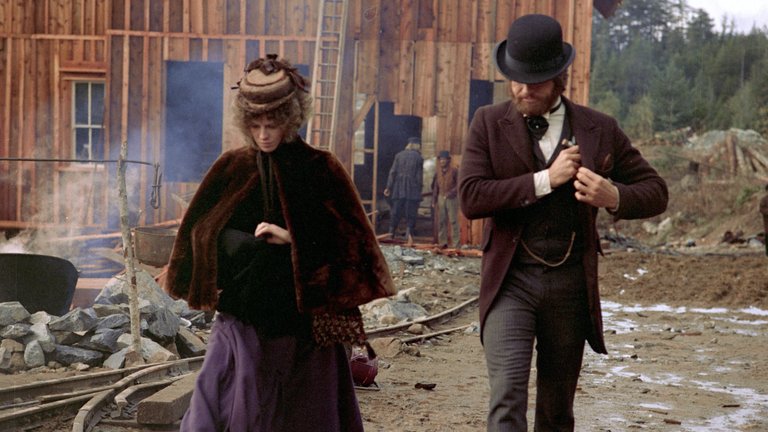Film Review: McCabe & Mrs. Miller (1971)

The early 1970s marked the culmination of a seismic shift in the Western genre, a transformation from mythic heroism to unflinching revisionism. While earlier films like The Searchers or The Man Who Shot Liberty Valance had begun to interrogate the romanticism of the American frontier, it was the cultural ferment of the Vietnam War era that catalysed a full rejection of the genre’s foundational myths. Enter Robert Altman’s McCabe & Mrs. Miller (1971), a film the director aptly termed an “anti-Western.” Set against a backdrop of national disillusionment, Altman’s vision dismantles the tropes of Manifest Destiny and rugged individualism, replacing them with a wintry parable of greed, isolation, and existential futility. This is not the West of John Wayne, but a mud-smeared, rain-lashed purgatory where capitalism and human frailty conspire to crush the soul.
Adapted from Edmund Naughton’s 1959 novel McCabe, the film unfolds in Presbyterian Church, a ramshackle mining town in 1902 Washington State. John McCabe (Warren Beatty), a self-styled entrepreneur with a penchant for tall tales, arrives peddling ambition and a deck of cards. Mistaken for a legendary gunslinger, McCabe leans into the myth, leveraging his reputation to establish a brothel. Enter Constance Miller (Julie Christie), a shrewd, opium-addicted madam who partners with McCabe to transform his squalid operation into a lucrative enterprise. Their success attracts the attention of the Harrison Shaughnessy Mining Company, whose agents offer to buy McCabe out. His drunken hubris—a blend of greed and misplaced bravado—leads him to reject their terms, unwittingly signing his death warrant. The arrival of hired assassin Butler (Hugh Millais) forces McCabe into a desperate, inept showdown, stripping bare the illusion of the lone gunslinger’s invincibility.
Altman and co-writer Brian McKay craft a narrative that is less a story of frontier conquest than a dirge for the American Dream. The West here is no land of opportunity but a claustrophobic trap, its characters ensnared by their own vices and the encroaching machinery of corporate power. The film’s setting—a time when the frontier was supposedly “tamed”—only sharpens its critique: progress is synonymous with exploitation, and civilisation is a veneer for brutality.
Gone are the vast, sun-drenched plains of classical Westerns. Vilmos Zsigmond’s cinematography cloaks Presbyterian Church in perpetual twilight, its muddy streets and skeletal buildings swallowed by mist and snow. The town, a huddle of ramshackle structures amid encroaching wilderness, becomes a character in itself—a liminal space where hope goes to die. The residents, far from the stalwart pioneers of myth, are drunks, labourers, and prostitutes grinding through lives of numbing monotony. Altman’s camera lingers on their faces: weathered, vacant, etched with resignation.
McCabe and Mrs. Miller are fitting anti-heroes for this world. Beatty, then a matinee idol, subverts his charm to play a man whose bluster masks profound inadequacy. McCabe is no noble outlaw but a small-time grifter, his “gunslinger” reputation a fiction he can’t live up to. Christie’s Mrs. Miller, meanwhile, is all pragmatism and detachment, her beauty obscured by grime and addiction. Their relationship, transactional yet tinged with vulnerability, epitomises the film’s rejection of romanticism. Even their business—a brothel—is a metaphor for the era’s hollow promises: a veneer of respectability masking exploitation.
Altman’s signature ensemble approach breathes life into the margins. Keith Carradine, in an early role as a nameless cowboy, delivers a haunting vignette: his character’s senseless murder underscores the arbitrary violence of this world. Conversely, William Devane’s turn as a lawyer spouting William Jennings Bryan’s populist rhetoric feels undercooked, a footnote in a film more interested in quiet despair than political satire.
Zsigmond’s cinematography—grainy, desaturated, and steeped in natural light—lends the film a documentary rawness. Interior scenes, bathed in the amber glow of oil lamps, feel oppressively intimate, while the final showdown unfolds in a blizzard, its chaos rendered with chilling immediacy. Leonard Cohen’s soundtrack, though not his most iconic work, complements the mood with its gravelly melancholy. Tracks like “The Stranger Song” and “Sisters of Mercy” function as a Greek chorus, their lyrics (“It’s true that all the men you knew were dealers…”) echoing the film’s themes of alienation and doomed enterprise.
The film’s languid first act, meandering through the town’s dreary rhythms, has drawn criticism for its sluggishness. Yet this deliberate pacing serves a purpose: it immerses the viewer in the suffocating inertia of Presbyterian Church, making the eruption of violence in the climax all the more jarring. When McCabe faces off against Butler’s henchmen, Altman dismantles the mythos of the Western showdown. There’s no heroic bravado here—only a terrified man stumbling through snowdrifts, his bullets finding their mark through luck rather than skill. The townsfolk, oblivious to his plight, rally to save their burning church—a symbol of communal delusion—leaving McCabe to die alone in the drifts.
Initially met with mixed reviews, McCabe & Mrs. Miller has since been lauded as a cornerstone of New Hollywood. Its box office success—a testament to Altman’s growing clout and the star power of Beatty and Christie—belied its bleakness, appealing to audiences weary of traditional genre fare. Today, it stands as Altman’s most cohesive fusion of style and substance, a film that prefigured the disillusioned ethos of 1970s cinema.
RATING: 7/10 (+++)
Blog in Croatian https://draxblog.com
Blog in English https://draxreview.wordpress.com/
InLeo blog https://inleo.io/@drax.leo
Hiveonboard: https://hiveonboard.com?ref=drax
InLeo: https://inleo.io/signup?referral=drax.leo
Rising Star game: https://www.risingstargame.com?referrer=drax
1Inch: https://1inch.exchange/#/r/0x83823d8CCB74F828148258BB4457642124b1328e
BTC donations: 1EWxiMiP6iiG9rger3NuUSd6HByaxQWafG
ETH donations: 0xB305F144323b99e6f8b1d66f5D7DE78B498C32A7
BCH donations: qpvxw0jax79lhmvlgcldkzpqanf03r9cjv8y6gtmk9
The film's theme says:
The individual is no longer able to assert himself in the face of corporate power and cruel reality.